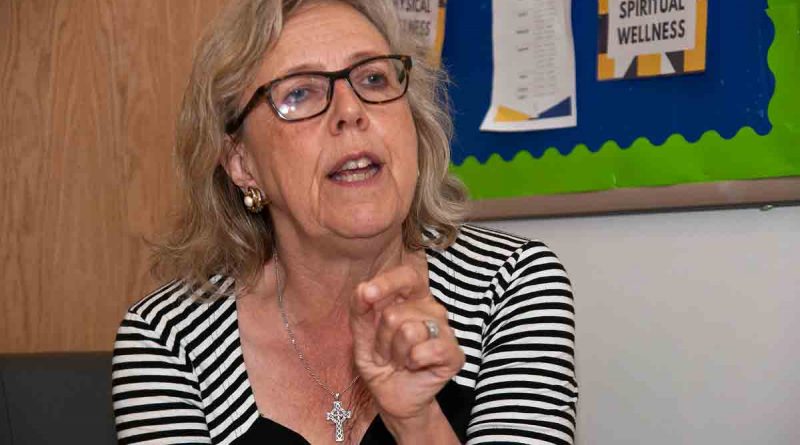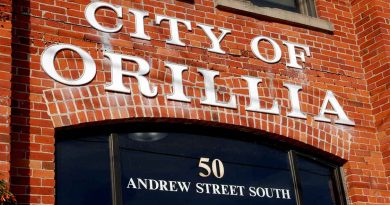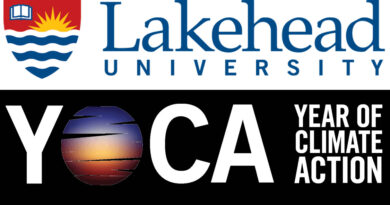May’s Foreign Policy Cred
By John Swartz
Green Party leader Elizabeth May was in Orillia July 17 as part of her Community Matters, 30 riding tour across Canada in advance of the election call in September. She spoke to a packed house at Lakehead University and three of four area candidates were there to be introduced to and meet potential voters – Simcoe North candidate Erik Schomann included.
Following her speech and Q&A, SUNonline/Orillia had a few minutes with May. Since the general perception of what the Green Party is about green energy, conservation, climate change, etc., we thought it was prudent to ask questions few get around to about foreign policy, specifically China and Russia and their influence on our economy and public discourse.
The size of the crowd (the largest this correspondent has seen for a Green Party anything in this area) may signal a general warming up to the Green Party by voters. It may be the Green Party and Elizabeth May could be king-makers on election night if no other party gets a majority, giving them a place to exert some influence on government regarding policy on a range of issues.
China
Over the last 5 years China has been flexing muscles the West didn’t think they had. Canada found out this year just how much a jab from China can hurt. We may sit back and arrogantly think China isn’t playing by the rules and eventually they’ll come around, but this would be wishful thinking. The Chinese have become too big economically and are no slouches militarily (maybe not technologically as advanced as the west). They are hitting hard on trade. We may not have felt their actions at street level, yet, but if push comes to shove, we’re going to fall over.
“The People’s Republic of China model for business is predatory and basically espionage,” said May.
There have been several cases in the news south of the border in recent weeks of spies being arrested or convicted, and in the week prior to May being in Orillia we had the beginnings of our own National story with a strong whiff of spying on the side.
“The reason solar panels are now so much cheaper than they could have been otherwise is the Chinese stole the technology after it was developed by big investment from Germany. Chinese companies hacked Nortel, we lost Nortel, one of our biggest technology companies, big employer, important part of our economy because of hacking and stealing of the technology,” said May.
“So how do we deal with this? This is one of the most important economic drivers on the planet. I think diplomacy has to stay very focused on working relationships that are not naïve.”
Trade is the weapon of choice at the moment. Canada chased after China for trade deals since the 1990s, and those deals are starting to look they are not worth the paper they are written on when sanctions are so easily placed for political reasons. May thinks we should play the game differently.
In March, China unexpectedly stopped shipments of canola (worth $4 billion in 2018) and revoked licenses of Canada’s two biggest exporters (Richardson International Limited and Viterra Inc.) for allegedly contaminated shipments:
“quarantine pests have been repeatedly detected in imported Canadian canola seed including Leptosphaeria maculans, Pseudomonas syringae pv. Maculicola, Avena ludoviciana Durien, Xanthium sp and Amaranthus palmeri S. Watson.”
Canadian authorities basically said that’s hogwash. Several speculate the canola stoppage is related to the arrest of Meng Wanzhou, chief financial officer of Huawei.
“When the canola ban was put in place, instead of assuming this was tit for tat because we got caught between Trump and China; we should have said, take(n) it seriously, “you say there’s something wrong with our canola, show us.” Let us see the canola product that you think had contamination. We have to be fair about this, maybe it did; you show me yours, I’ll show you ours.” said May.
In a perfect world, someone would have asked, but it appears no one in government has insisted. We’ve heard little about it, other than there may be some financial aid for canola farmers. Canada chased trade deals like they were a panacea to our economic prosperity. May says, one of them is more trouble than it’s worth.
“We made a huge mistake under Harper. He passed in cabinet, we didn’t even have a vote in Parliament, the Canada China Investment Treaty, so Stephen Harper has left us with a treaty we can’t get out of without renegotiating. They’ll never let us out of it because we basically frozen in place the discriminatory practices in China against Canadian companies while giving the People’s Republic of China the ability to sue us if we change any laws or regulations that reduce their expectation of profit. We need to renegotiate and get out of the Canada China Investment Treaty,” said May.
The place we are in may not be a good one, but May’s assessment of how we arrived is more nuanced and at the same time blunt, which might serve to broaden her appeal to Canadian voters. Chinese relations are as important to the Green Party here and the various Green Parties of the world because of the Green’s major plank.
“I think with the People’s Republic of China we have to work with them. They’re absolutely critical on a climate emergency issue. We also have to keep pressing for protection of human rights,” said May.
Russia
When it comes to Russia, it’s not a trade that is the weapon, but words, or more correctly, us. Earlier May told the audience, in answer to a question regarding the sorry state of social media, there is not a lot can be done with media companies which find themselves knee deep in spreading fake news. But she did say we have to recognize the fake news purveyors (Russia) can’t harm if we don’t let them.
“We have to also be critical thinkers,” she said. “Look at it carefully. Don’t share it, don’t re-tweet it, read it and think about it – is this true, do I want to spread a fire that fast?”
Logically, we’d each see the road apples for what they are, but logic was effectively kicked out of the room in 2015 (earlier actually) when the Russian disinformation machine went into overdrive to affect the American election, and the lessons have observably been employed in other countries. Canada is one of them. May thinks we set ourselves up by not understanding what the events of 1989 really meant.
“We don’t know what other countries might want to affect Canada’s elections, but we do know that Vladimir Putin’s forces are implicated in the U.S. election and other elections. We made, the West, in the early 90s, we made a tragic error in being so thrilled that communism had collapsed. We ignored the fact that it needed the equivalent of a Marshal Plan,” said May
“We ignored the fact that democracy doesn’t happen overnight because communism has collapsed. We needed to get in there, we needed to invest in a civil society, we needed to help them. Instead the life expectancy of the average Russian has been plummeting. They’ve been looted by the pseudo capitalists, but they’re really just pirates within Russia who are stealing their resources because now that communism is gone there’s a high degree of crony capitalism with the friends of Putin. For the people of Russia it’s a disaster. I think we have to re-engage with ways we can help Russian civil society build, we didn’t do it, we should have done it right from the beginning,” said May.
In a roundabout way, May seems to be saying had we, the West, not been so giddy about the fall of the Berlin Wall, we might have done something which would have made the rise of Putin impossible. Of course, that doesn’t mean someone just as devious, or worse, might have come through the ranks, but surely the tea leaves couldn’t have been much clearer with a former KGB officer taking power in Russia.
The Alt-Right And The Election
We have our own problems with Russian fueled far right (or alt-right) agitation in our political process, elections. The fake news posts on Canadian social media pages started in 2016 and haven’t let up. Canadians by the thousands get sucked in every day with posts that seem believable, until you check out the veracity of the slogans. Our own political leadership doesn’t appear to be immune to fake news, or maybe they do recognize it.
“Doug Ford and his embracing of some of those elements, not all of them, Andrew Scheer has been playing footsie with some of them, we have to make sure as a Canadians we call it out, name it, and say this is a country which is inclusive, welcome to everyone, and do not allow ourselves to be manipulated by the notion there is some other group out there that has it better than we do. That’s why social cohesion and equity is critical in society, populism can’t catch on unless you allow an unequal situation,” said May.
The last issue to discuss was in a way about fake news, but mostly its ignorance of what the Green Party is beyond the perception of tree huggers. Anyone who has looked into their economic policy knows they are anything but socialists, yet, the media and many politicians of other parties keep using that word.
“Never mind the NDP saying we are secret conservatives. Everybody’s going to have some theory about us. Our slogan this election campaign is, Not Left, Not Right, Forward Together. So there’s good ideas in the left wing toolkit, there’s some good ideas in the right wing toolkit. You have to take the solutions that work to move ahead. carbon pricing is fine. That’s basically a right wing idea from market-based theory in the U.S.,” said May.
“We have to get rid of poverty in Canada. One of the greatest proponents of that, besides me, was Hugh Segal, who was a conservative. I think the left / right is less significant these days than the populist / elitist kind of divide and we have to be inclusive.”
(Photos by Swartz – SUNonline/Orillia)




